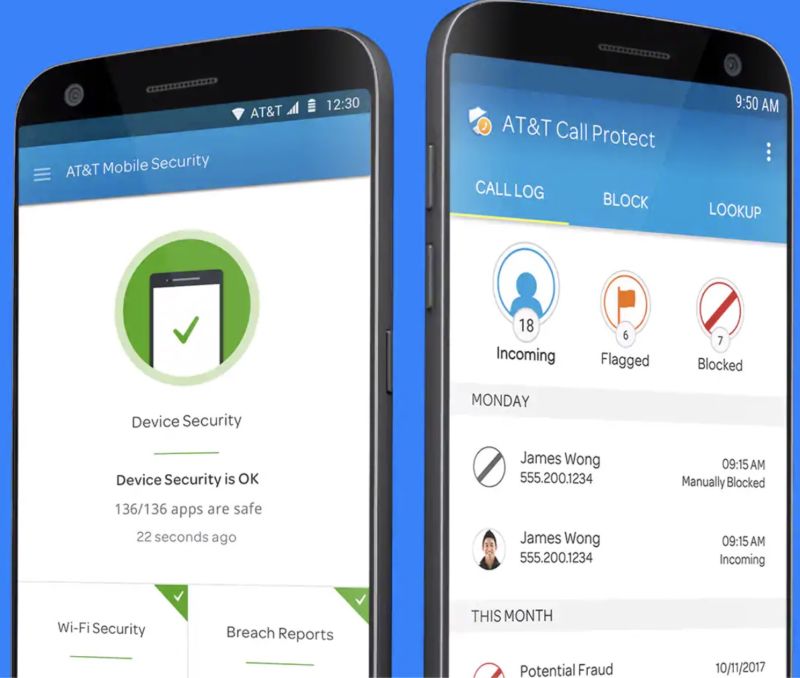
AT&T yesterday said it will add “automatic fraud blocking and suspected spam-call alerts” to mobile phone lines for no added cost, but the carrier still imposes limits on blocking of spam calls unless customers pay extra.
“New AT&T Mobility consumer lines will come with the anti-robocall service. Millions of existing AT&T customers also will have it automatically added to their accounts over the coming months,” AT&T’s announcement said.
Despite the change, customers will still have to manually add undesired phone numbers to block lists or pay $4 a month to send all suspected spam calls to voicemail. That’s because this is little more than an expansion of AT&T’s Call Protect service, which has a basic free tier and a paid tier with automatic blocking of spam calls.
Call Protect has been available since 2016 but only if customers opted in to it. The difference now is that Call Protect will be added to AT&T phone lines automatically.
The Federal Communications Commission voted last month to let phone companies block robocalls by default even when consumers have not opted in to robocall-blocking services. Carriers can enable robocall blocking “as long as their customers are informed and have the opportunity to opt out of the blocking,” the FCC said at the time.
AT&T said the FCC vote is what allowed the carrier to expand Call Protect to users without waiting for them to opt in. The FCC ruling “clarifies that call-blocking tools may be offered by phone service providers on an ‘opt out’ basis,” AT&T said. “That means we can automatically provide you the service unless you decline, instead of first asking you to download an app or go to your settings to ‘opt in.'”
Call Protect is not available to AT&T prepaid customers, but AT&T told Ars that it will be added automatically “to most consumer, postpaid HD Voice lines” in the coming months. Customers will be notified by text message when the service is added. If you don’t want to wait, AT&T says you can download the AT&T Call Protect app or enable Call Protect in the myAT&T account settings.
No automatic blocking of spam calls
As we previously mentioned, the service doesn’t automatically block all nuisance calls. Notice that the AT&T announcement promised “automatic fraud blocking and suspected spam-call alerts” but not automatic blocking of spam calls. Calls that AT&T categorizes as “fraud” won’t ring your phone, but calls categorized as “spam” will ring your phone despite coming with a warning.
Fraud calls, naturally, are those in which AT&T suspects the caller is trying to defraud the user. By contrast, “spam calls are calls that a customer may consider to be a nuisance, but that is subjective to each customer,” AT&T told us. AT&T’s Call Protect website says further that “Suspected spam may include service messages and/or other permitted calls.” AT&T says it identifies fraud and spam calls “through data analytics and network blocking, as well as reports from customers.”
There are two ways for AT&T customers to block those spam calls. The first way is cumbersome but free, and the second way costs $4 a month but automatically sends the spam calls to voicemail.
The free way is to make a personal block list using the basic version of AT&T’s Call Protect service. But that requires adding unwanted numbers manually. Both iPhones and Android phones have built-in call-blocking features that work independently from your carrier anyway.
For $4 a month, the premium version of AT&T Call Protect adds “Custom Call Controls,” an option that sends suspected spam calls to voicemail automatically. Call Protect Plus also includes Enhanced Caller ID that identifies the caller name and location.
The FCC vote in June did not require carriers to offer call blocking for free, even though Democratic Commissioner Jessica Rosenworcel had urged the Republican majority to mandate free robocall blocking.
AT&T said it will continue offering the fee-based Call Protect Plus service and hasn’t promised any changes that would move spam blocking into the free tier. “The Call Protect Plus service will still be offered, however we will have more to share in the coming months,” AT&T told us.
https://arstechnica.com/?p=1534199

